Private and Confidential Pitchers
VerifiedAdded on 2022/09/14
|11
|2803
|14
AI Summary
Contribute Materials
Your contribution can guide someone’s learning journey. Share your
documents today.
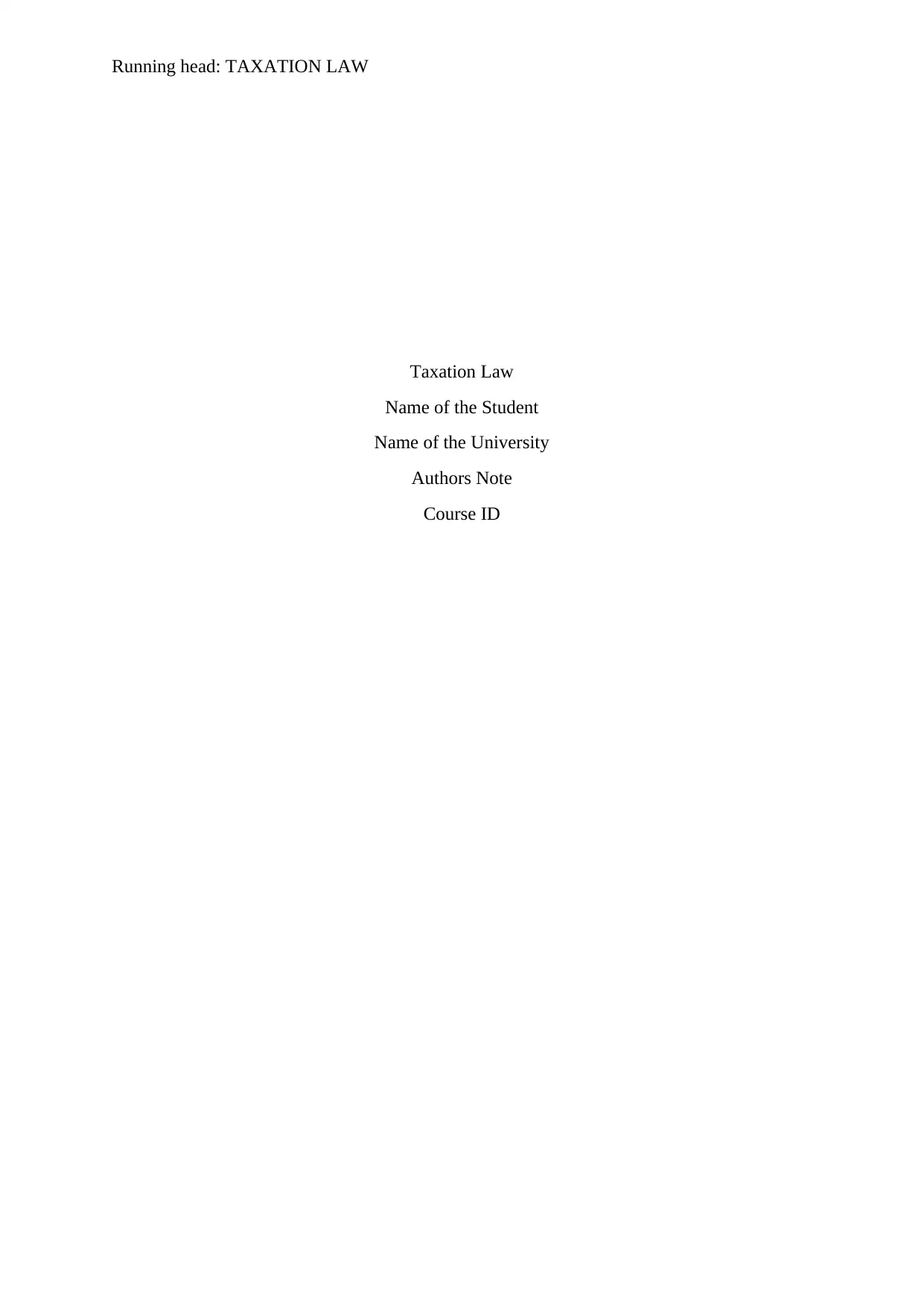
Running head: TAXATION LAW
Taxation Law
Name of the Student
Name of the University
Authors Note
Course ID
Taxation Law
Name of the Student
Name of the University
Authors Note
Course ID
Secure Best Marks with AI Grader
Need help grading? Try our AI Grader for instant feedback on your assignments.
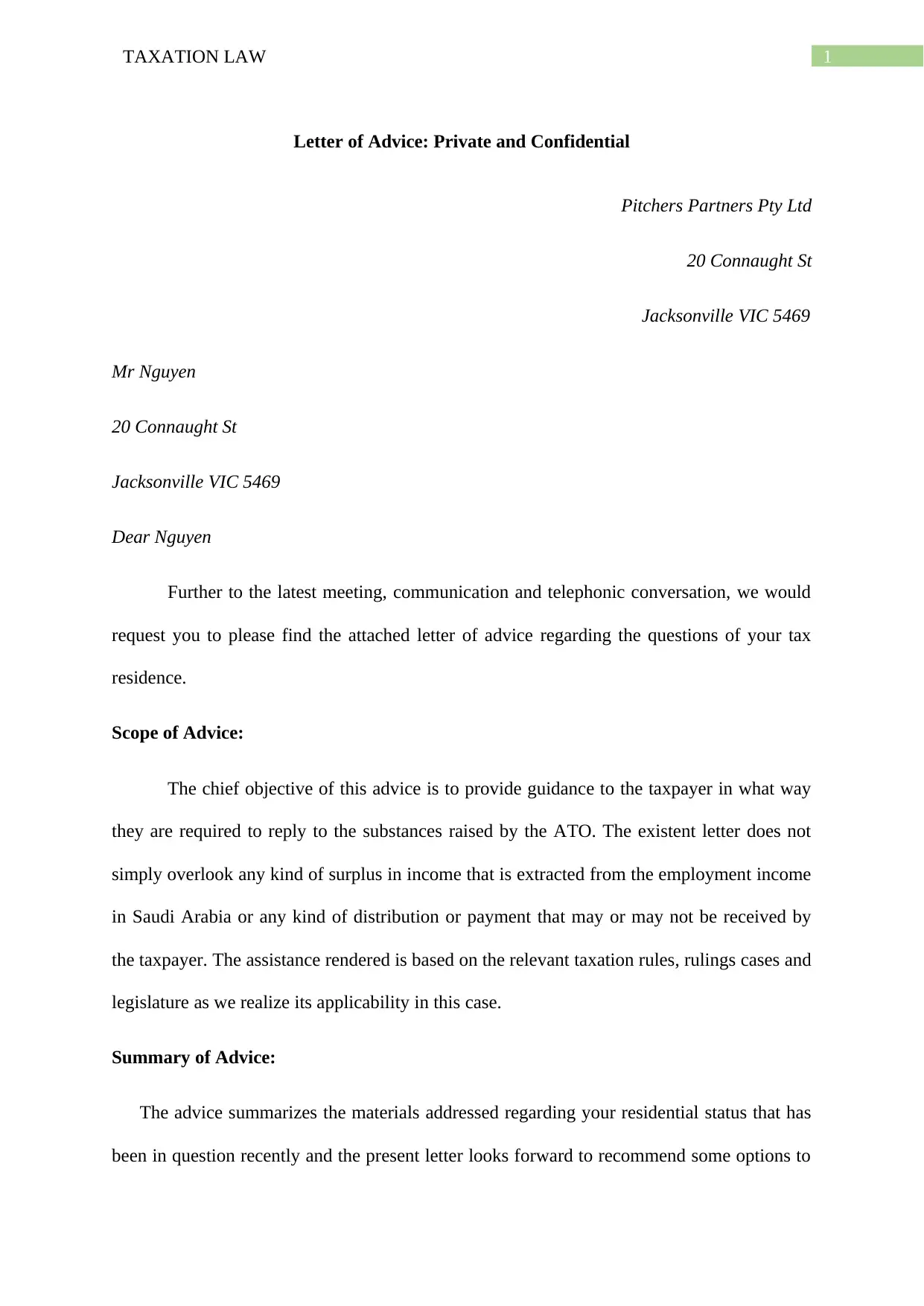
1TAXATION LAW
Letter of Advice: Private and Confidential
Pitchers Partners Pty Ltd
20 Connaught St
Jacksonville VIC 5469
Mr Nguyen
20 Connaught St
Jacksonville VIC 5469
Dear Nguyen
Further to the latest meeting, communication and telephonic conversation, we would
request you to please find the attached letter of advice regarding the questions of your tax
residence.
Scope of Advice:
The chief objective of this advice is to provide guidance to the taxpayer in what way
they are required to reply to the substances raised by the ATO. The existent letter does not
simply overlook any kind of surplus in income that is extracted from the employment income
in Saudi Arabia or any kind of distribution or payment that may or may not be received by
the taxpayer. The assistance rendered is based on the relevant taxation rules, rulings cases and
legislature as we realize its applicability in this case.
Summary of Advice:
The advice summarizes the materials addressed regarding your residential status that has
been in question recently and the present letter looks forward to recommend some options to
Letter of Advice: Private and Confidential
Pitchers Partners Pty Ltd
20 Connaught St
Jacksonville VIC 5469
Mr Nguyen
20 Connaught St
Jacksonville VIC 5469
Dear Nguyen
Further to the latest meeting, communication and telephonic conversation, we would
request you to please find the attached letter of advice regarding the questions of your tax
residence.
Scope of Advice:
The chief objective of this advice is to provide guidance to the taxpayer in what way
they are required to reply to the substances raised by the ATO. The existent letter does not
simply overlook any kind of surplus in income that is extracted from the employment income
in Saudi Arabia or any kind of distribution or payment that may or may not be received by
the taxpayer. The assistance rendered is based on the relevant taxation rules, rulings cases and
legislature as we realize its applicability in this case.
Summary of Advice:
The advice summarizes the materials addressed regarding your residential status that has
been in question recently and the present letter looks forward to recommend some options to
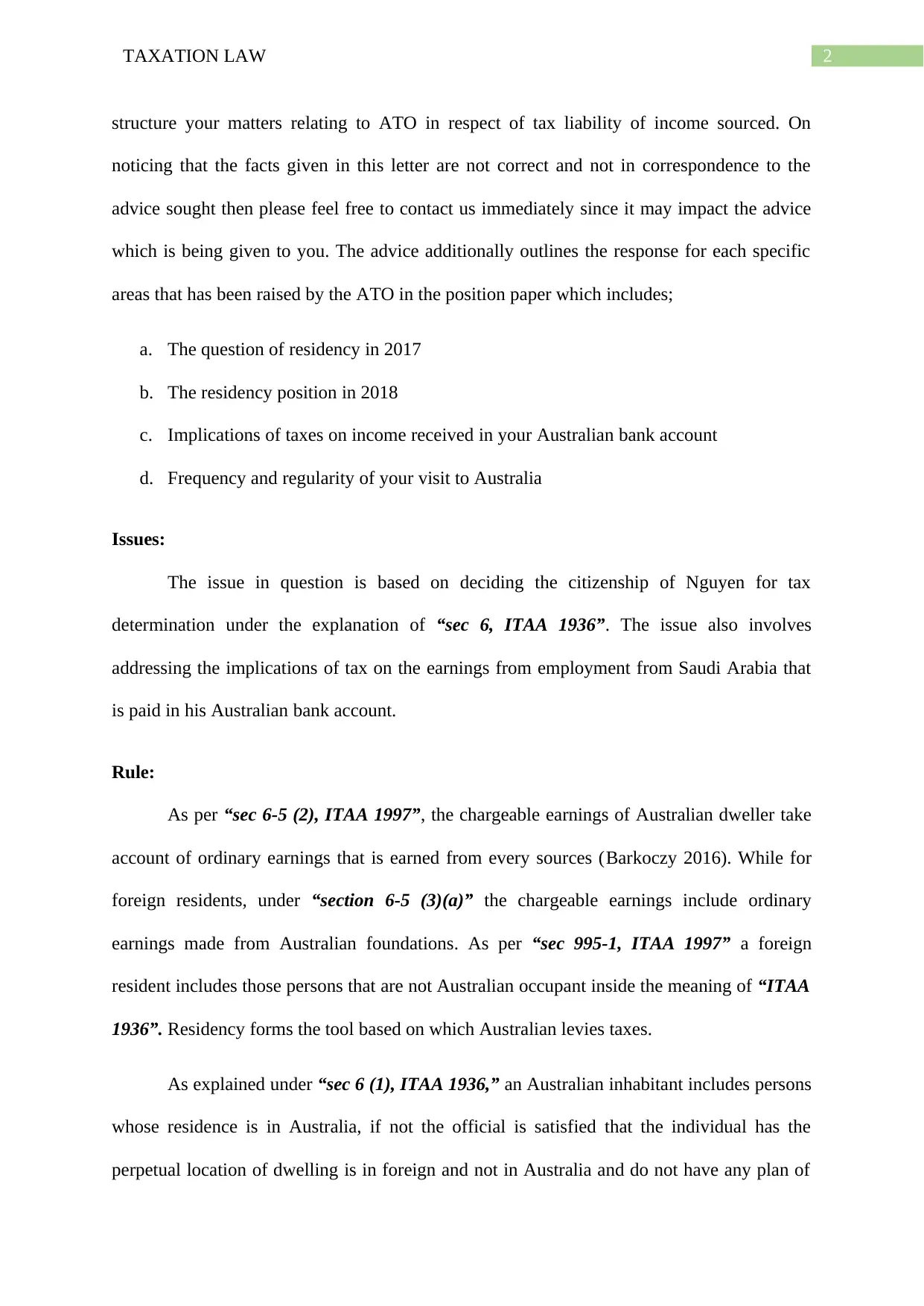
2TAXATION LAW
structure your matters relating to ATO in respect of tax liability of income sourced. On
noticing that the facts given in this letter are not correct and not in correspondence to the
advice sought then please feel free to contact us immediately since it may impact the advice
which is being given to you. The advice additionally outlines the response for each specific
areas that has been raised by the ATO in the position paper which includes;
a. The question of residency in 2017
b. The residency position in 2018
c. Implications of taxes on income received in your Australian bank account
d. Frequency and regularity of your visit to Australia
Issues:
The issue in question is based on deciding the citizenship of Nguyen for tax
determination under the explanation of “sec 6, ITAA 1936”. The issue also involves
addressing the implications of tax on the earnings from employment from Saudi Arabia that
is paid in his Australian bank account.
Rule:
As per “sec 6-5 (2), ITAA 1997”, the chargeable earnings of Australian dweller take
account of ordinary earnings that is earned from every sources (Barkoczy 2016). While for
foreign residents, under “section 6-5 (3)(a)” the chargeable earnings include ordinary
earnings made from Australian foundations. As per “sec 995-1, ITAA 1997” a foreign
resident includes those persons that are not Australian occupant inside the meaning of “ITAA
1936”. Residency forms the tool based on which Australian levies taxes.
As explained under “sec 6 (1), ITAA 1936,” an Australian inhabitant includes persons
whose residence is in Australia, if not the official is satisfied that the individual has the
perpetual location of dwelling is in foreign and not in Australia and do not have any plan of
structure your matters relating to ATO in respect of tax liability of income sourced. On
noticing that the facts given in this letter are not correct and not in correspondence to the
advice sought then please feel free to contact us immediately since it may impact the advice
which is being given to you. The advice additionally outlines the response for each specific
areas that has been raised by the ATO in the position paper which includes;
a. The question of residency in 2017
b. The residency position in 2018
c. Implications of taxes on income received in your Australian bank account
d. Frequency and regularity of your visit to Australia
Issues:
The issue in question is based on deciding the citizenship of Nguyen for tax
determination under the explanation of “sec 6, ITAA 1936”. The issue also involves
addressing the implications of tax on the earnings from employment from Saudi Arabia that
is paid in his Australian bank account.
Rule:
As per “sec 6-5 (2), ITAA 1997”, the chargeable earnings of Australian dweller take
account of ordinary earnings that is earned from every sources (Barkoczy 2016). While for
foreign residents, under “section 6-5 (3)(a)” the chargeable earnings include ordinary
earnings made from Australian foundations. As per “sec 995-1, ITAA 1997” a foreign
resident includes those persons that are not Australian occupant inside the meaning of “ITAA
1936”. Residency forms the tool based on which Australian levies taxes.
As explained under “sec 6 (1), ITAA 1936,” an Australian inhabitant includes persons
whose residence is in Australia, if not the official is satisfied that the individual has the
perpetual location of dwelling is in foreign and not in Australia and do not have any plan of
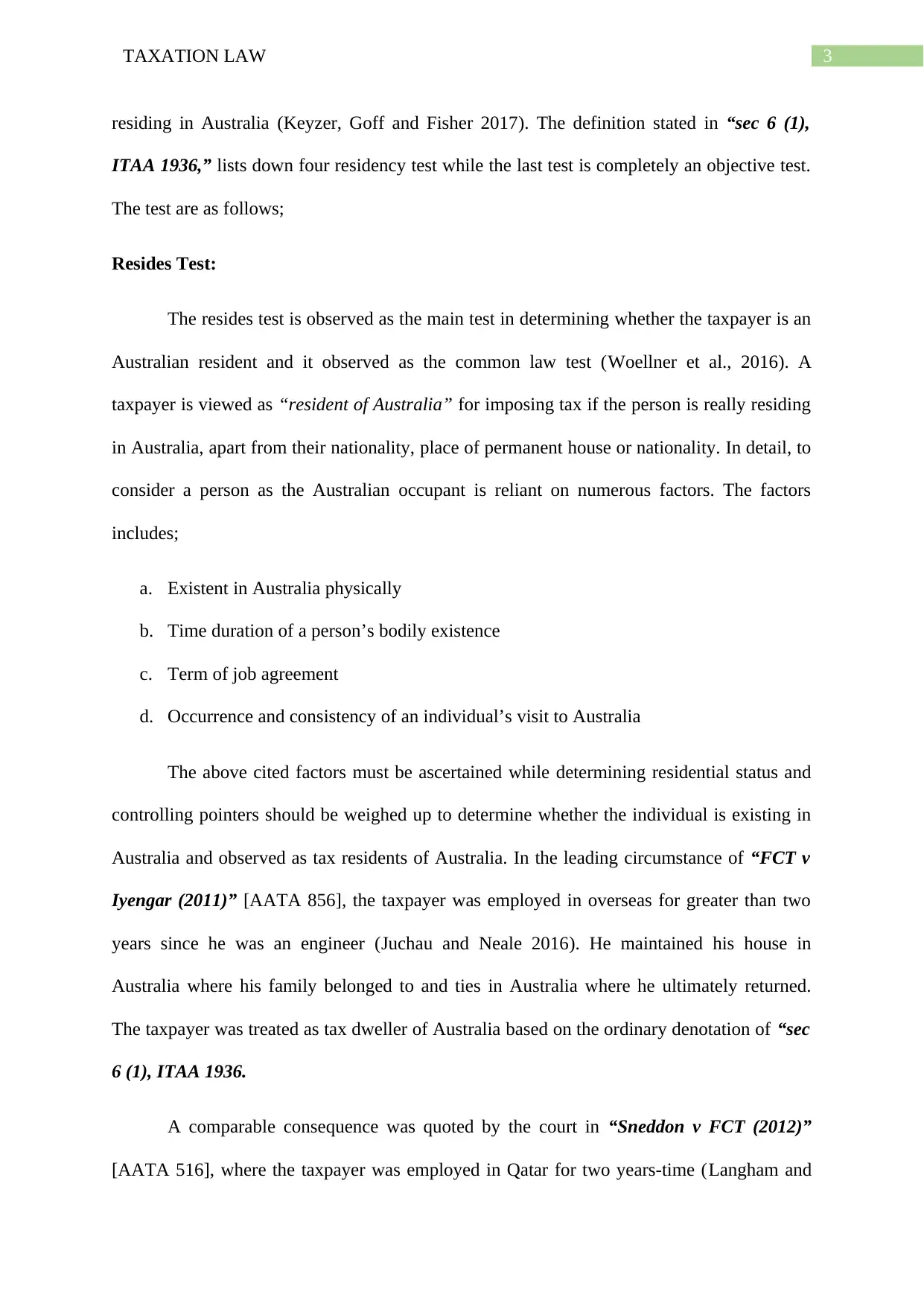
3TAXATION LAW
residing in Australia (Keyzer, Goff and Fisher 2017). The definition stated in “sec 6 (1),
ITAA 1936,” lists down four residency test while the last test is completely an objective test.
The test are as follows;
Resides Test:
The resides test is observed as the main test in determining whether the taxpayer is an
Australian resident and it observed as the common law test (Woellner et al., 2016). A
taxpayer is viewed as “resident of Australia” for imposing tax if the person is really residing
in Australia, apart from their nationality, place of permanent house or nationality. In detail, to
consider a person as the Australian occupant is reliant on numerous factors. The factors
includes;
a. Existent in Australia physically
b. Time duration of a person’s bodily existence
c. Term of job agreement
d. Occurrence and consistency of an individual’s visit to Australia
The above cited factors must be ascertained while determining residential status and
controlling pointers should be weighed up to determine whether the individual is existing in
Australia and observed as tax residents of Australia. In the leading circumstance of “FCT v
Iyengar (2011)” [AATA 856], the taxpayer was employed in overseas for greater than two
years since he was an engineer (Juchau and Neale 2016). He maintained his house in
Australia where his family belonged to and ties in Australia where he ultimately returned.
The taxpayer was treated as tax dweller of Australia based on the ordinary denotation of “sec
6 (1), ITAA 1936.
A comparable consequence was quoted by the court in “Sneddon v FCT (2012)”
[AATA 516], where the taxpayer was employed in Qatar for two years-time (Langham and
residing in Australia (Keyzer, Goff and Fisher 2017). The definition stated in “sec 6 (1),
ITAA 1936,” lists down four residency test while the last test is completely an objective test.
The test are as follows;
Resides Test:
The resides test is observed as the main test in determining whether the taxpayer is an
Australian resident and it observed as the common law test (Woellner et al., 2016). A
taxpayer is viewed as “resident of Australia” for imposing tax if the person is really residing
in Australia, apart from their nationality, place of permanent house or nationality. In detail, to
consider a person as the Australian occupant is reliant on numerous factors. The factors
includes;
a. Existent in Australia physically
b. Time duration of a person’s bodily existence
c. Term of job agreement
d. Occurrence and consistency of an individual’s visit to Australia
The above cited factors must be ascertained while determining residential status and
controlling pointers should be weighed up to determine whether the individual is existing in
Australia and observed as tax residents of Australia. In the leading circumstance of “FCT v
Iyengar (2011)” [AATA 856], the taxpayer was employed in overseas for greater than two
years since he was an engineer (Juchau and Neale 2016). He maintained his house in
Australia where his family belonged to and ties in Australia where he ultimately returned.
The taxpayer was treated as tax dweller of Australia based on the ordinary denotation of “sec
6 (1), ITAA 1936.
A comparable consequence was quoted by the court in “Sneddon v FCT (2012)”
[AATA 516], where the taxpayer was employed in Qatar for two years-time (Langham and
Secure Best Marks with AI Grader
Need help grading? Try our AI Grader for instant feedback on your assignments.
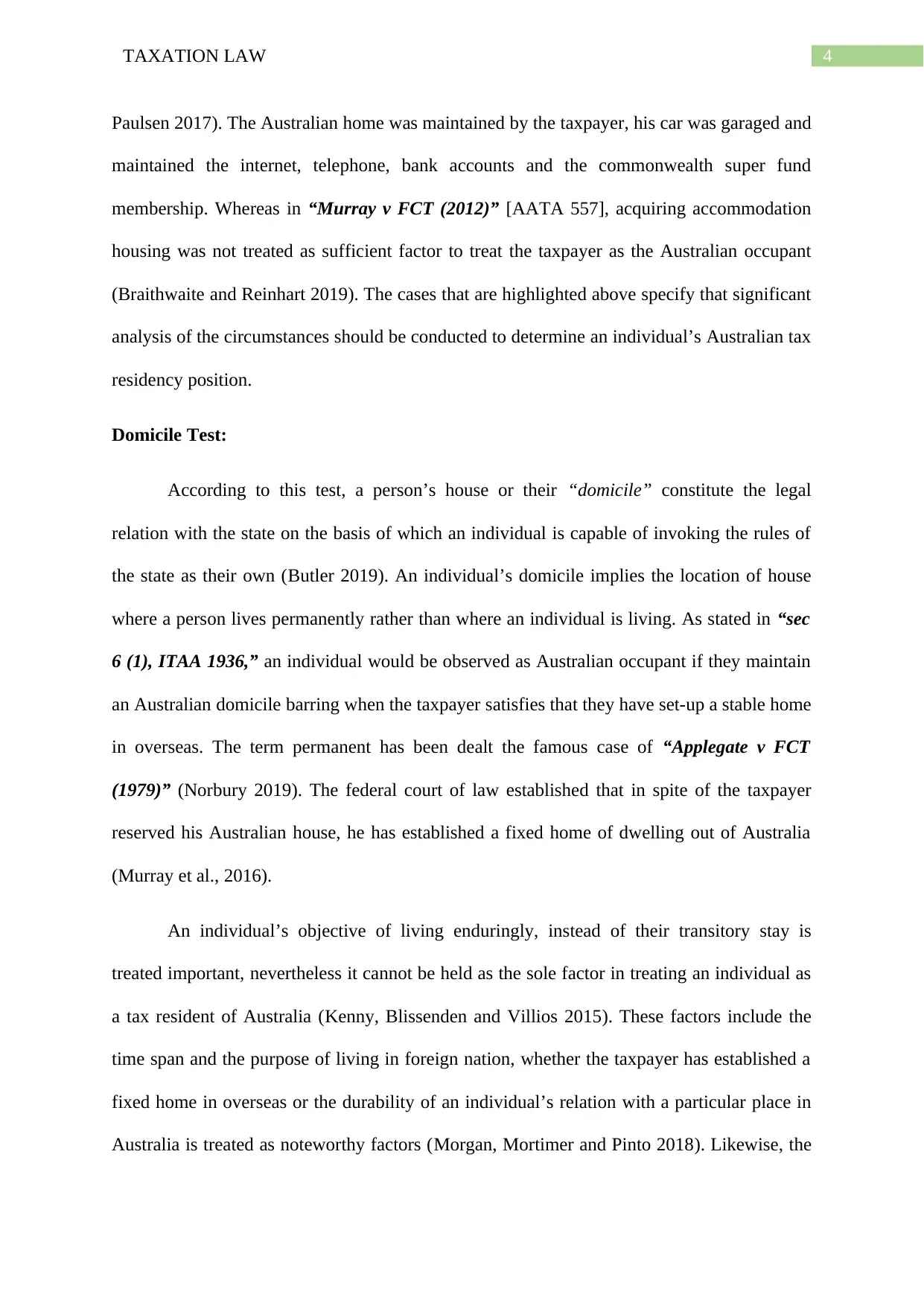
4TAXATION LAW
Paulsen 2017). The Australian home was maintained by the taxpayer, his car was garaged and
maintained the internet, telephone, bank accounts and the commonwealth super fund
membership. Whereas in “Murray v FCT (2012)” [AATA 557], acquiring accommodation
housing was not treated as sufficient factor to treat the taxpayer as the Australian occupant
(Braithwaite and Reinhart 2019). The cases that are highlighted above specify that significant
analysis of the circumstances should be conducted to determine an individual’s Australian tax
residency position.
Domicile Test:
According to this test, a person’s house or their “domicile” constitute the legal
relation with the state on the basis of which an individual is capable of invoking the rules of
the state as their own (Butler 2019). An individual’s domicile implies the location of house
where a person lives permanently rather than where an individual is living. As stated in “sec
6 (1), ITAA 1936,” an individual would be observed as Australian occupant if they maintain
an Australian domicile barring when the taxpayer satisfies that they have set-up a stable home
in overseas. The term permanent has been dealt the famous case of “Applegate v FCT
(1979)” (Norbury 2019). The federal court of law established that in spite of the taxpayer
reserved his Australian house, he has established a fixed home of dwelling out of Australia
(Murray et al., 2016).
An individual’s objective of living enduringly, instead of their transitory stay is
treated important, nevertheless it cannot be held as the sole factor in treating an individual as
a tax resident of Australia (Kenny, Blissenden and Villios 2015). These factors include the
time span and the purpose of living in foreign nation, whether the taxpayer has established a
fixed home in overseas or the durability of an individual’s relation with a particular place in
Australia is treated as noteworthy factors (Morgan, Mortimer and Pinto 2018). Likewise, the
Paulsen 2017). The Australian home was maintained by the taxpayer, his car was garaged and
maintained the internet, telephone, bank accounts and the commonwealth super fund
membership. Whereas in “Murray v FCT (2012)” [AATA 557], acquiring accommodation
housing was not treated as sufficient factor to treat the taxpayer as the Australian occupant
(Braithwaite and Reinhart 2019). The cases that are highlighted above specify that significant
analysis of the circumstances should be conducted to determine an individual’s Australian tax
residency position.
Domicile Test:
According to this test, a person’s house or their “domicile” constitute the legal
relation with the state on the basis of which an individual is capable of invoking the rules of
the state as their own (Butler 2019). An individual’s domicile implies the location of house
where a person lives permanently rather than where an individual is living. As stated in “sec
6 (1), ITAA 1936,” an individual would be observed as Australian occupant if they maintain
an Australian domicile barring when the taxpayer satisfies that they have set-up a stable home
in overseas. The term permanent has been dealt the famous case of “Applegate v FCT
(1979)” (Norbury 2019). The federal court of law established that in spite of the taxpayer
reserved his Australian house, he has established a fixed home of dwelling out of Australia
(Murray et al., 2016).
An individual’s objective of living enduringly, instead of their transitory stay is
treated important, nevertheless it cannot be held as the sole factor in treating an individual as
a tax resident of Australia (Kenny, Blissenden and Villios 2015). These factors include the
time span and the purpose of living in foreign nation, whether the taxpayer has established a
fixed home in overseas or the durability of an individual’s relation with a particular place in
Australia is treated as noteworthy factors (Morgan, Mortimer and Pinto 2018). Likewise, the
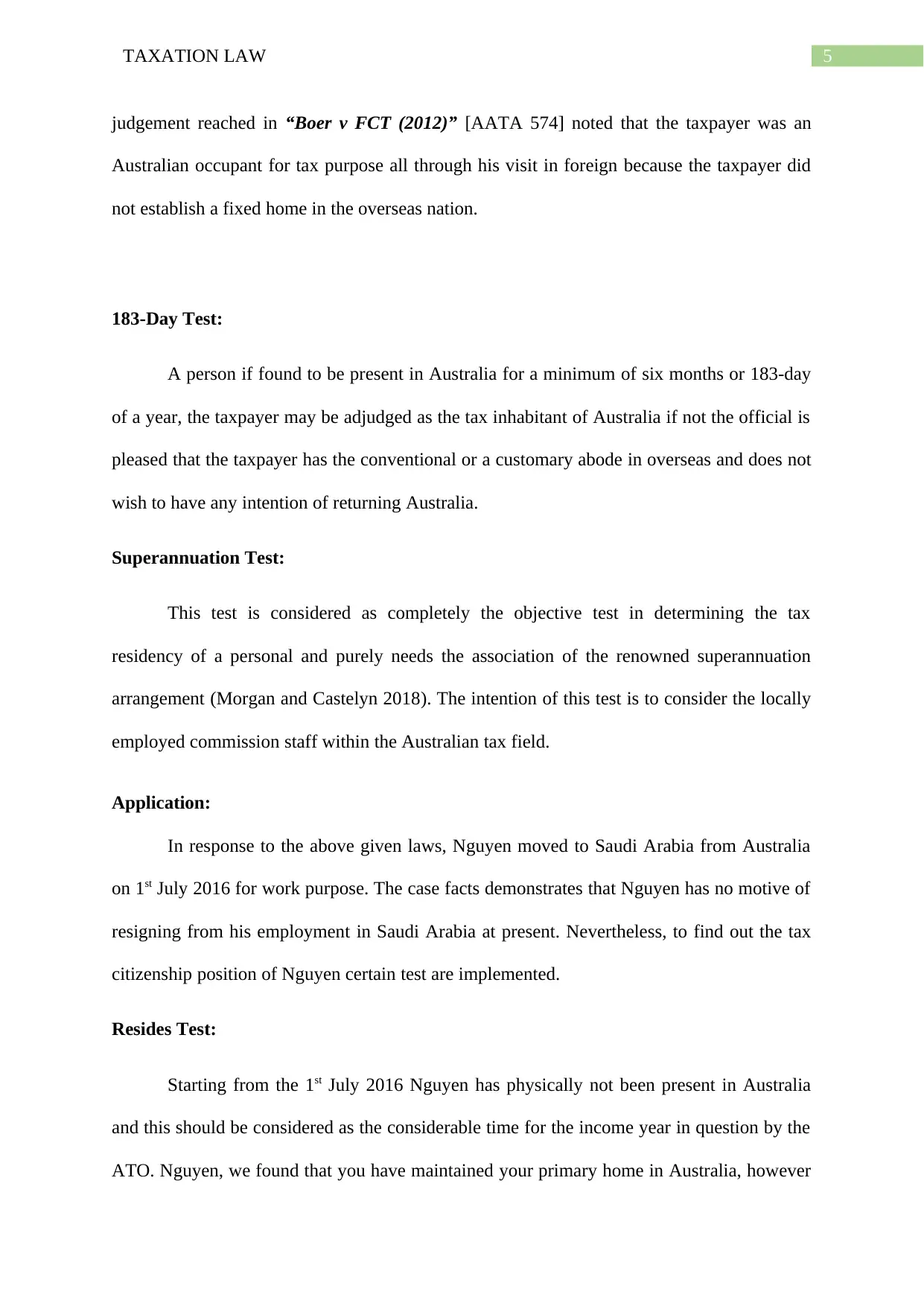
5TAXATION LAW
judgement reached in “Boer v FCT (2012)” [AATA 574] noted that the taxpayer was an
Australian occupant for tax purpose all through his visit in foreign because the taxpayer did
not establish a fixed home in the overseas nation.
183-Day Test:
A person if found to be present in Australia for a minimum of six months or 183-day
of a year, the taxpayer may be adjudged as the tax inhabitant of Australia if not the official is
pleased that the taxpayer has the conventional or a customary abode in overseas and does not
wish to have any intention of returning Australia.
Superannuation Test:
This test is considered as completely the objective test in determining the tax
residency of a personal and purely needs the association of the renowned superannuation
arrangement (Morgan and Castelyn 2018). The intention of this test is to consider the locally
employed commission staff within the Australian tax field.
Application:
In response to the above given laws, Nguyen moved to Saudi Arabia from Australia
on 1st July 2016 for work purpose. The case facts demonstrates that Nguyen has no motive of
resigning from his employment in Saudi Arabia at present. Nevertheless, to find out the tax
citizenship position of Nguyen certain test are implemented.
Resides Test:
Starting from the 1st July 2016 Nguyen has physically not been present in Australia
and this should be considered as the considerable time for the income year in question by the
ATO. Nguyen, we found that you have maintained your primary home in Australia, however
judgement reached in “Boer v FCT (2012)” [AATA 574] noted that the taxpayer was an
Australian occupant for tax purpose all through his visit in foreign because the taxpayer did
not establish a fixed home in the overseas nation.
183-Day Test:
A person if found to be present in Australia for a minimum of six months or 183-day
of a year, the taxpayer may be adjudged as the tax inhabitant of Australia if not the official is
pleased that the taxpayer has the conventional or a customary abode in overseas and does not
wish to have any intention of returning Australia.
Superannuation Test:
This test is considered as completely the objective test in determining the tax
residency of a personal and purely needs the association of the renowned superannuation
arrangement (Morgan and Castelyn 2018). The intention of this test is to consider the locally
employed commission staff within the Australian tax field.
Application:
In response to the above given laws, Nguyen moved to Saudi Arabia from Australia
on 1st July 2016 for work purpose. The case facts demonstrates that Nguyen has no motive of
resigning from his employment in Saudi Arabia at present. Nevertheless, to find out the tax
citizenship position of Nguyen certain test are implemented.
Resides Test:
Starting from the 1st July 2016 Nguyen has physically not been present in Australia
and this should be considered as the considerable time for the income year in question by the
ATO. Nguyen, we found that you have maintained your primary home in Australia, however
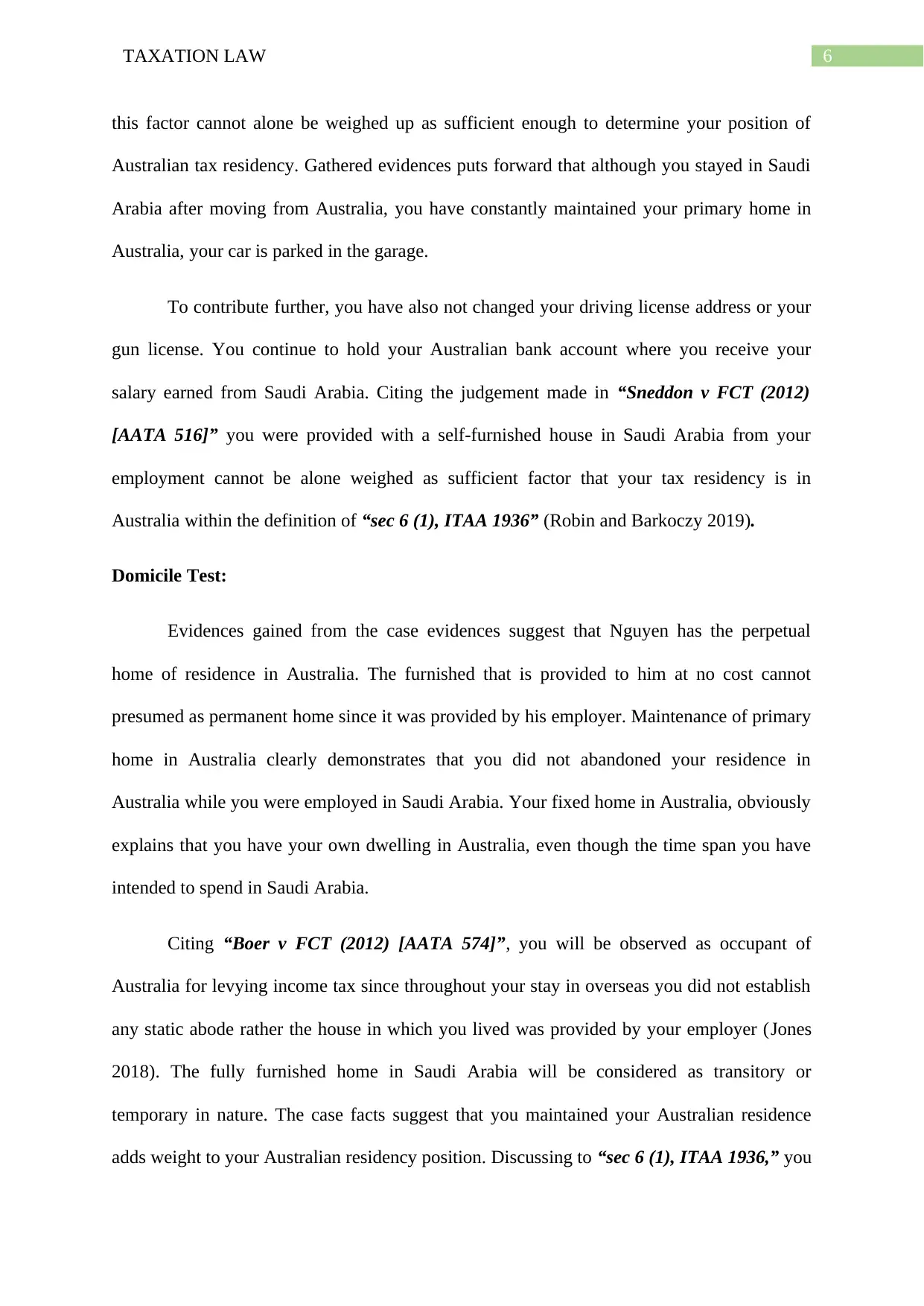
6TAXATION LAW
this factor cannot alone be weighed up as sufficient enough to determine your position of
Australian tax residency. Gathered evidences puts forward that although you stayed in Saudi
Arabia after moving from Australia, you have constantly maintained your primary home in
Australia, your car is parked in the garage.
To contribute further, you have also not changed your driving license address or your
gun license. You continue to hold your Australian bank account where you receive your
salary earned from Saudi Arabia. Citing the judgement made in “Sneddon v FCT (2012)
[AATA 516]” you were provided with a self-furnished house in Saudi Arabia from your
employment cannot be alone weighed as sufficient factor that your tax residency is in
Australia within the definition of “sec 6 (1), ITAA 1936” (Robin and Barkoczy 2019).
Domicile Test:
Evidences gained from the case evidences suggest that Nguyen has the perpetual
home of residence in Australia. The furnished that is provided to him at no cost cannot
presumed as permanent home since it was provided by his employer. Maintenance of primary
home in Australia clearly demonstrates that you did not abandoned your residence in
Australia while you were employed in Saudi Arabia. Your fixed home in Australia, obviously
explains that you have your own dwelling in Australia, even though the time span you have
intended to spend in Saudi Arabia.
Citing “Boer v FCT (2012) [AATA 574]”, you will be observed as occupant of
Australia for levying income tax since throughout your stay in overseas you did not establish
any static abode rather the house in which you lived was provided by your employer (Jones
2018). The fully furnished home in Saudi Arabia will be considered as transitory or
temporary in nature. The case facts suggest that you maintained your Australian residence
adds weight to your Australian residency position. Discussing to “sec 6 (1), ITAA 1936,” you
this factor cannot alone be weighed up as sufficient enough to determine your position of
Australian tax residency. Gathered evidences puts forward that although you stayed in Saudi
Arabia after moving from Australia, you have constantly maintained your primary home in
Australia, your car is parked in the garage.
To contribute further, you have also not changed your driving license address or your
gun license. You continue to hold your Australian bank account where you receive your
salary earned from Saudi Arabia. Citing the judgement made in “Sneddon v FCT (2012)
[AATA 516]” you were provided with a self-furnished house in Saudi Arabia from your
employment cannot be alone weighed as sufficient factor that your tax residency is in
Australia within the definition of “sec 6 (1), ITAA 1936” (Robin and Barkoczy 2019).
Domicile Test:
Evidences gained from the case evidences suggest that Nguyen has the perpetual
home of residence in Australia. The furnished that is provided to him at no cost cannot
presumed as permanent home since it was provided by his employer. Maintenance of primary
home in Australia clearly demonstrates that you did not abandoned your residence in
Australia while you were employed in Saudi Arabia. Your fixed home in Australia, obviously
explains that you have your own dwelling in Australia, even though the time span you have
intended to spend in Saudi Arabia.
Citing “Boer v FCT (2012) [AATA 574]”, you will be observed as occupant of
Australia for levying income tax since throughout your stay in overseas you did not establish
any static abode rather the house in which you lived was provided by your employer (Jones
2018). The fully furnished home in Saudi Arabia will be considered as transitory or
temporary in nature. The case facts suggest that you maintained your Australian residence
adds weight to your Australian residency position. Discussing to “sec 6 (1), ITAA 1936,” you
Paraphrase This Document
Need a fresh take? Get an instant paraphrase of this document with our AI Paraphraser
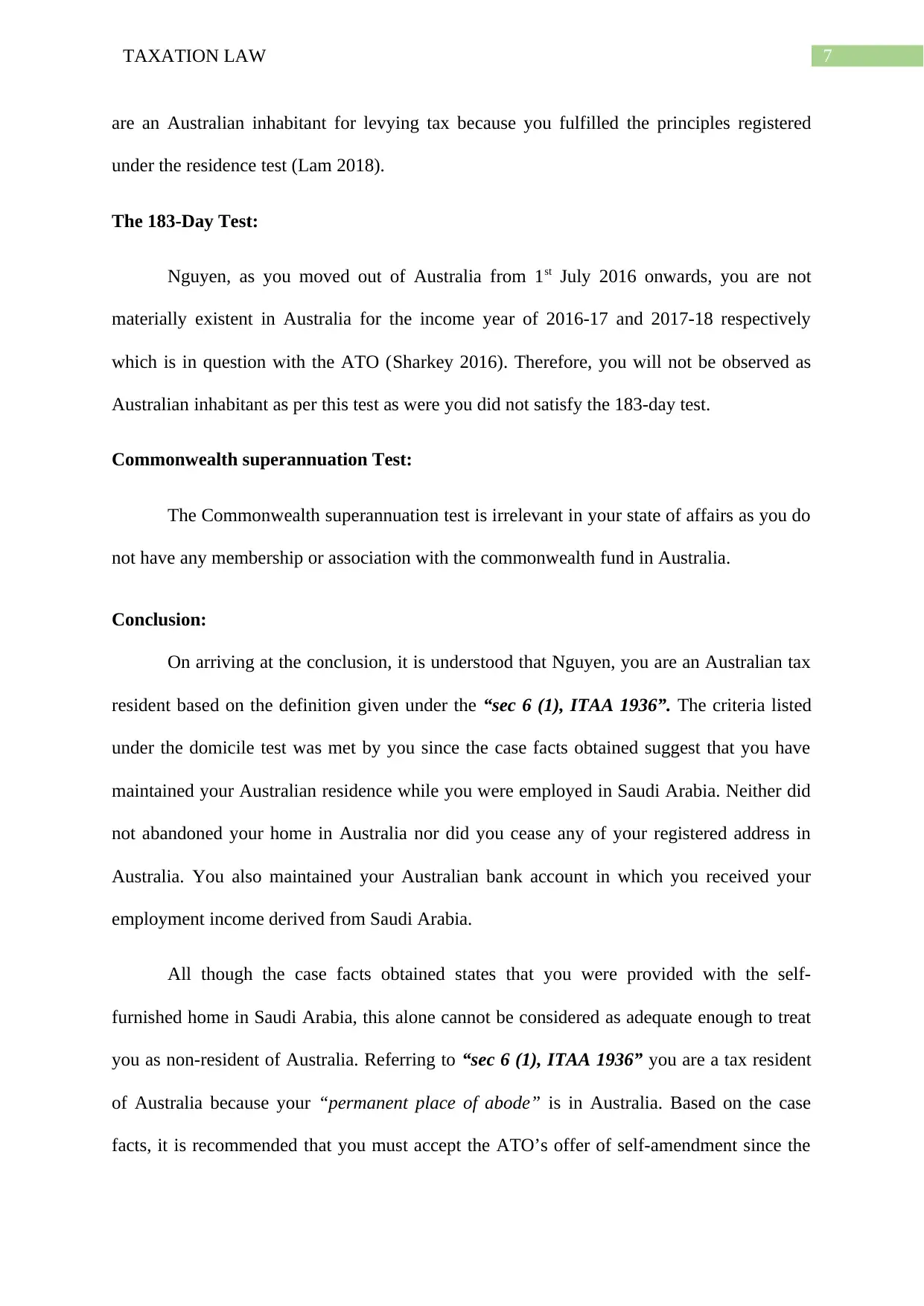
7TAXATION LAW
are an Australian inhabitant for levying tax because you fulfilled the principles registered
under the residence test (Lam 2018).
The 183-Day Test:
Nguyen, as you moved out of Australia from 1st July 2016 onwards, you are not
materially existent in Australia for the income year of 2016-17 and 2017-18 respectively
which is in question with the ATO (Sharkey 2016). Therefore, you will not be observed as
Australian inhabitant as per this test as were you did not satisfy the 183-day test.
Commonwealth superannuation Test:
The Commonwealth superannuation test is irrelevant in your state of affairs as you do
not have any membership or association with the commonwealth fund in Australia.
Conclusion:
On arriving at the conclusion, it is understood that Nguyen, you are an Australian tax
resident based on the definition given under the “sec 6 (1), ITAA 1936”. The criteria listed
under the domicile test was met by you since the case facts obtained suggest that you have
maintained your Australian residence while you were employed in Saudi Arabia. Neither did
not abandoned your home in Australia nor did you cease any of your registered address in
Australia. You also maintained your Australian bank account in which you received your
employment income derived from Saudi Arabia.
All though the case facts obtained states that you were provided with the self-
furnished home in Saudi Arabia, this alone cannot be considered as adequate enough to treat
you as non-resident of Australia. Referring to “sec 6 (1), ITAA 1936” you are a tax resident
of Australia because your “permanent place of abode” is in Australia. Based on the case
facts, it is recommended that you must accept the ATO’s offer of self-amendment since the
are an Australian inhabitant for levying tax because you fulfilled the principles registered
under the residence test (Lam 2018).
The 183-Day Test:
Nguyen, as you moved out of Australia from 1st July 2016 onwards, you are not
materially existent in Australia for the income year of 2016-17 and 2017-18 respectively
which is in question with the ATO (Sharkey 2016). Therefore, you will not be observed as
Australian inhabitant as per this test as were you did not satisfy the 183-day test.
Commonwealth superannuation Test:
The Commonwealth superannuation test is irrelevant in your state of affairs as you do
not have any membership or association with the commonwealth fund in Australia.
Conclusion:
On arriving at the conclusion, it is understood that Nguyen, you are an Australian tax
resident based on the definition given under the “sec 6 (1), ITAA 1936”. The criteria listed
under the domicile test was met by you since the case facts obtained suggest that you have
maintained your Australian residence while you were employed in Saudi Arabia. Neither did
not abandoned your home in Australia nor did you cease any of your registered address in
Australia. You also maintained your Australian bank account in which you received your
employment income derived from Saudi Arabia.
All though the case facts obtained states that you were provided with the self-
furnished home in Saudi Arabia, this alone cannot be considered as adequate enough to treat
you as non-resident of Australia. Referring to “sec 6 (1), ITAA 1936” you are a tax resident
of Australia because your “permanent place of abode” is in Australia. Based on the case
facts, it is recommended that you must accept the ATO’s offer of self-amendment since the
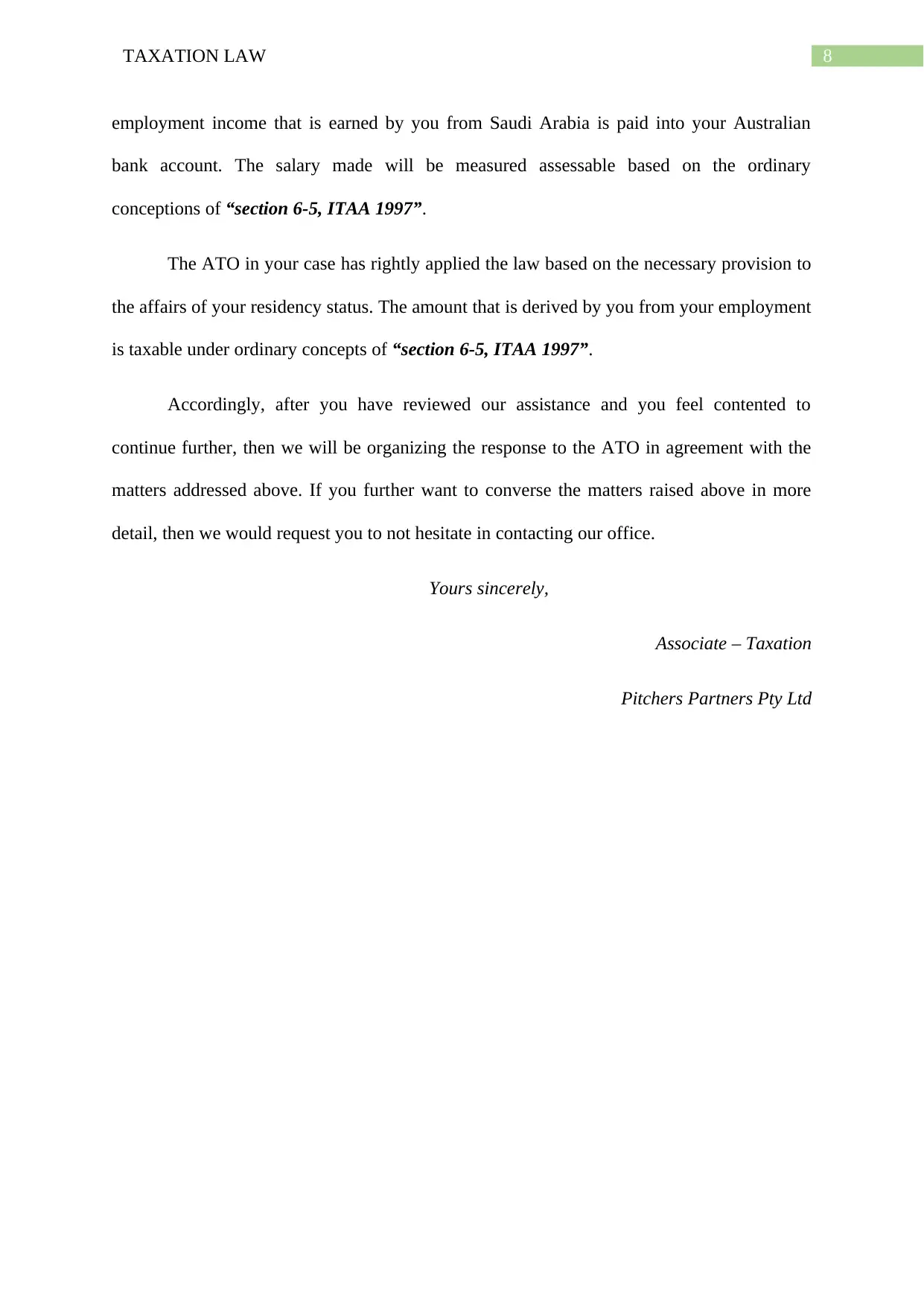
8TAXATION LAW
employment income that is earned by you from Saudi Arabia is paid into your Australian
bank account. The salary made will be measured assessable based on the ordinary
conceptions of “section 6-5, ITAA 1997”.
The ATO in your case has rightly applied the law based on the necessary provision to
the affairs of your residency status. The amount that is derived by you from your employment
is taxable under ordinary concepts of “section 6-5, ITAA 1997”.
Accordingly, after you have reviewed our assistance and you feel contented to
continue further, then we will be organizing the response to the ATO in agreement with the
matters addressed above. If you further want to converse the matters raised above in more
detail, then we would request you to not hesitate in contacting our office.
Yours sincerely,
Associate – Taxation
Pitchers Partners Pty Ltd
employment income that is earned by you from Saudi Arabia is paid into your Australian
bank account. The salary made will be measured assessable based on the ordinary
conceptions of “section 6-5, ITAA 1997”.
The ATO in your case has rightly applied the law based on the necessary provision to
the affairs of your residency status. The amount that is derived by you from your employment
is taxable under ordinary concepts of “section 6-5, ITAA 1997”.
Accordingly, after you have reviewed our assistance and you feel contented to
continue further, then we will be organizing the response to the ATO in agreement with the
matters addressed above. If you further want to converse the matters raised above in more
detail, then we would request you to not hesitate in contacting our office.
Yours sincerely,
Associate – Taxation
Pitchers Partners Pty Ltd
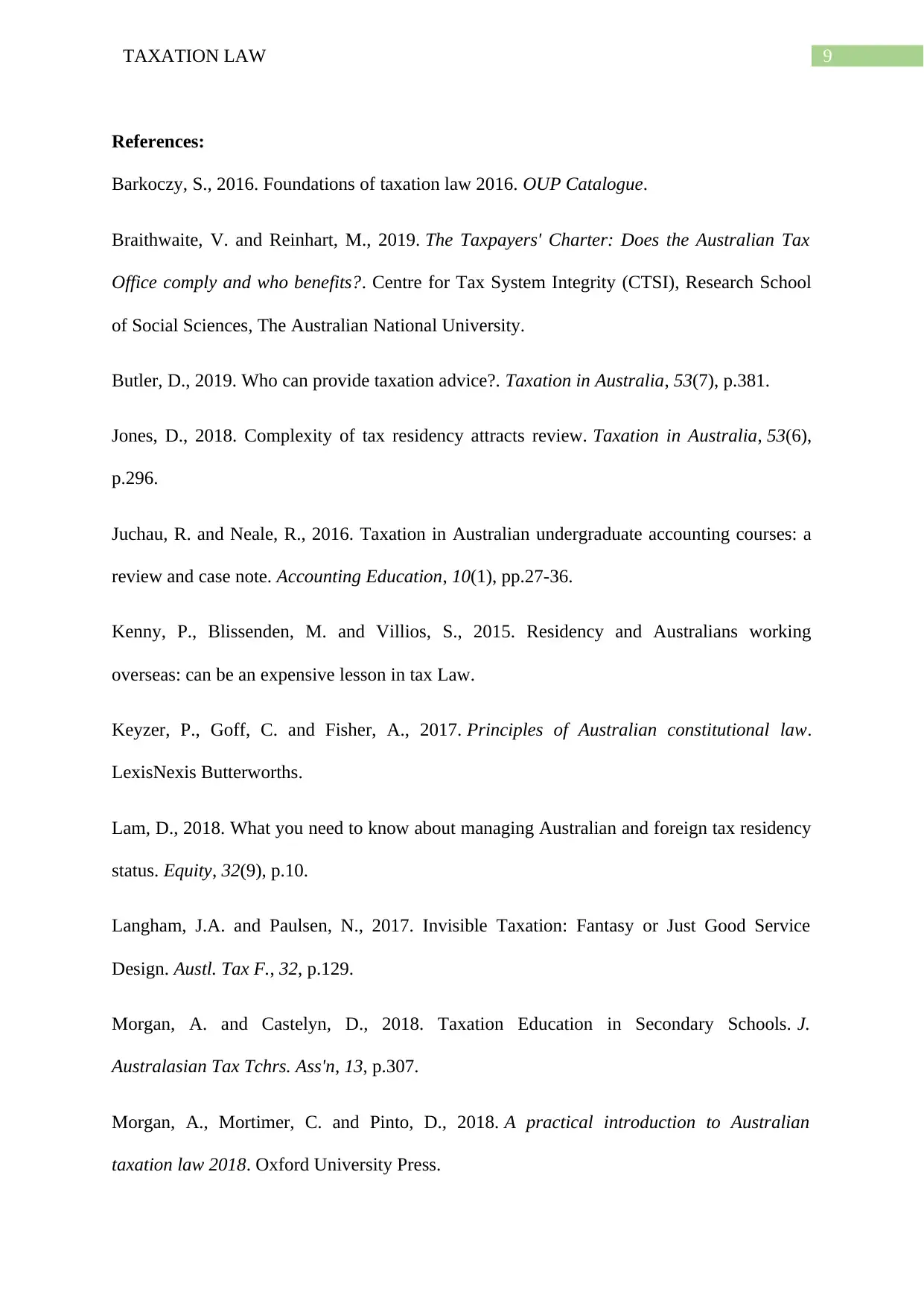
9TAXATION LAW
References:
Barkoczy, S., 2016. Foundations of taxation law 2016. OUP Catalogue.
Braithwaite, V. and Reinhart, M., 2019. The Taxpayers' Charter: Does the Australian Tax
Office comply and who benefits?. Centre for Tax System Integrity (CTSI), Research School
of Social Sciences, The Australian National University.
Butler, D., 2019. Who can provide taxation advice?. Taxation in Australia, 53(7), p.381.
Jones, D., 2018. Complexity of tax residency attracts review. Taxation in Australia, 53(6),
p.296.
Juchau, R. and Neale, R., 2016. Taxation in Australian undergraduate accounting courses: a
review and case note. Accounting Education, 10(1), pp.27-36.
Kenny, P., Blissenden, M. and Villios, S., 2015. Residency and Australians working
overseas: can be an expensive lesson in tax Law.
Keyzer, P., Goff, C. and Fisher, A., 2017. Principles of Australian constitutional law.
LexisNexis Butterworths.
Lam, D., 2018. What you need to know about managing Australian and foreign tax residency
status. Equity, 32(9), p.10.
Langham, J.A. and Paulsen, N., 2017. Invisible Taxation: Fantasy or Just Good Service
Design. Austl. Tax F., 32, p.129.
Morgan, A. and Castelyn, D., 2018. Taxation Education in Secondary Schools. J.
Australasian Tax Tchrs. Ass'n, 13, p.307.
Morgan, A., Mortimer, C. and Pinto, D., 2018. A practical introduction to Australian
taxation law 2018. Oxford University Press.
References:
Barkoczy, S., 2016. Foundations of taxation law 2016. OUP Catalogue.
Braithwaite, V. and Reinhart, M., 2019. The Taxpayers' Charter: Does the Australian Tax
Office comply and who benefits?. Centre for Tax System Integrity (CTSI), Research School
of Social Sciences, The Australian National University.
Butler, D., 2019. Who can provide taxation advice?. Taxation in Australia, 53(7), p.381.
Jones, D., 2018. Complexity of tax residency attracts review. Taxation in Australia, 53(6),
p.296.
Juchau, R. and Neale, R., 2016. Taxation in Australian undergraduate accounting courses: a
review and case note. Accounting Education, 10(1), pp.27-36.
Kenny, P., Blissenden, M. and Villios, S., 2015. Residency and Australians working
overseas: can be an expensive lesson in tax Law.
Keyzer, P., Goff, C. and Fisher, A., 2017. Principles of Australian constitutional law.
LexisNexis Butterworths.
Lam, D., 2018. What you need to know about managing Australian and foreign tax residency
status. Equity, 32(9), p.10.
Langham, J.A. and Paulsen, N., 2017. Invisible Taxation: Fantasy or Just Good Service
Design. Austl. Tax F., 32, p.129.
Morgan, A. and Castelyn, D., 2018. Taxation Education in Secondary Schools. J.
Australasian Tax Tchrs. Ass'n, 13, p.307.
Morgan, A., Mortimer, C. and Pinto, D., 2018. A practical introduction to Australian
taxation law 2018. Oxford University Press.
Secure Best Marks with AI Grader
Need help grading? Try our AI Grader for instant feedback on your assignments.
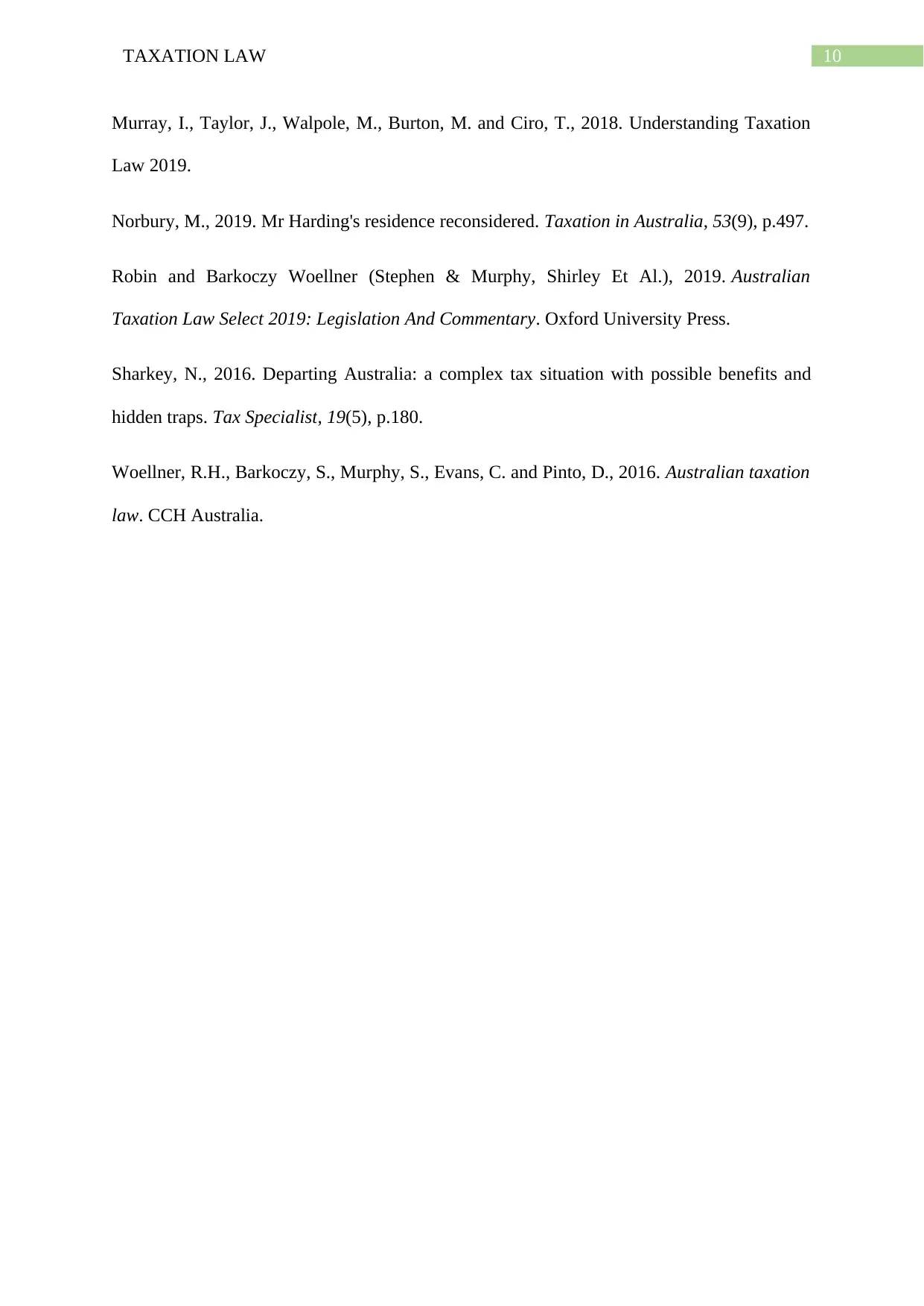
10TAXATION LAW
Murray, I., Taylor, J., Walpole, M., Burton, M. and Ciro, T., 2018. Understanding Taxation
Law 2019.
Norbury, M., 2019. Mr Harding's residence reconsidered. Taxation in Australia, 53(9), p.497.
Robin and Barkoczy Woellner (Stephen & Murphy, Shirley Et Al.), 2019. Australian
Taxation Law Select 2019: Legislation And Commentary. Oxford University Press.
Sharkey, N., 2016. Departing Australia: a complex tax situation with possible benefits and
hidden traps. Tax Specialist, 19(5), p.180.
Woellner, R.H., Barkoczy, S., Murphy, S., Evans, C. and Pinto, D., 2016. Australian taxation
law. CCH Australia.
Murray, I., Taylor, J., Walpole, M., Burton, M. and Ciro, T., 2018. Understanding Taxation
Law 2019.
Norbury, M., 2019. Mr Harding's residence reconsidered. Taxation in Australia, 53(9), p.497.
Robin and Barkoczy Woellner (Stephen & Murphy, Shirley Et Al.), 2019. Australian
Taxation Law Select 2019: Legislation And Commentary. Oxford University Press.
Sharkey, N., 2016. Departing Australia: a complex tax situation with possible benefits and
hidden traps. Tax Specialist, 19(5), p.180.
Woellner, R.H., Barkoczy, S., Murphy, S., Evans, C. and Pinto, D., 2016. Australian taxation
law. CCH Australia.
1 out of 11
Related Documents
Your All-in-One AI-Powered Toolkit for Academic Success.
+13062052269
info@desklib.com
Available 24*7 on WhatsApp / Email
![[object Object]](/_next/static/media/star-bottom.7253800d.svg)
Unlock your academic potential
© 2024 | Zucol Services PVT LTD | All rights reserved.




